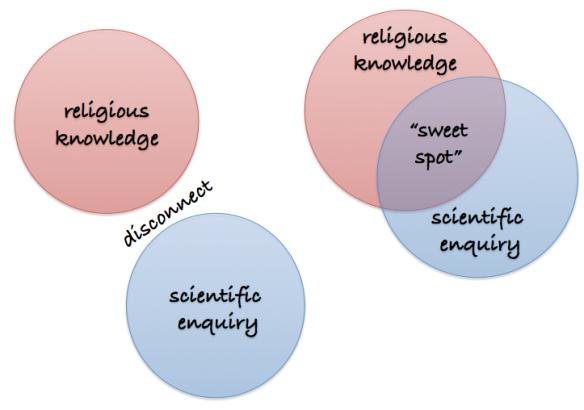 One hundred years ago today, `Abdu’l-Bahá was sailing towards New York, bringing His Father’s Faith to the new world. I believe him to be the finest theologian of the 20th century. Although He had been an exile and prisoner for most of His life, He was eloquent and erudite on matters of religion, but was equally comfortable elaborating on philosophy and science.
One hundred years ago today, `Abdu’l-Bahá was sailing towards New York, bringing His Father’s Faith to the new world. I believe him to be the finest theologian of the 20th century. Although He had been an exile and prisoner for most of His life, He was eloquent and erudite on matters of religion, but was equally comfortable elaborating on philosophy and science.
The venues he spoke in in North America – churches, synagogues and mosques, reflect the breadth of his vision and His call to unity. His appeal for people to reconcile their differences parallels His appeal for religion and science to agree.
Religion and science are the two wings upon which man’s intelligence can soar into the heights, with which the human soul can progress. It is not possible to fly with one wing alone! Should a man try to fly with the wing of religion alone he would quickly fall into the quagmire of superstition, whilst on the other hand, with the wing of science alone he would also make no progress, but fall into the despairing slough of materialism.[1]
The greatest scientist of the 20th Century, Albert Einstein, would later echo `Abdu’l-Bahá’s comments.[2]
`Abdu’l-Bahá identifies both religion and science as potent forces for human development. How sad that over 100 later, we still see these two great forces unreconciled.
A Bahá’í mathematician William Hatcher elaborates on the relationship between science and religion, presenting them as complementary tools for human advancement.
Science is bottom up – it starts by observation and goes up towards an abstract description of larger and larger portions of reality and religion is top down – it starts with a global description of the whole of reality and comes down. And that’s why you need both religion and science, you can’t do with just one… From the Bahá’í point of view, science is just as important for the spiritual development of the human being as is religion.
Learning from the past – the example of Islam
Of all the great religions, perhaps the best example of a complementary and productive relationship between science and religion comes from Islam. A dominant Eurocentric/secular world-view has discounted or ignored the contribution of Islam’s golden age between the 8th and 16th centuries. In the Islamic world the study and application of the Quran posed problems such as the direction of the Qibla, thus accelerating the development of sciences such as astronomy, geography, spherical geometry and spherical trigonometry. The word algebra is from the Arabic Al-jebr. Under Islam great universities were established. Applied sciences such as medicine and agriculture also thrived. Perhaps the greatest contribution of Islam was adaptation and development of zero (from earlier Hindi science). [3]
Science and philosophy were close companions in those days. Bahá’u’lláh quotes a Persian mystic poem that appears to enshrine scientific insight:
Split the atom’s heart, and lo! Within it thou wilt find a sun.[4]
Hitting the sweet spot
It took about 500 years for the Europeans to adopt zero, most likely because of their contempt and suspicion of Islam. If we regard religion and science as complementary and offering different perspectives on the world, creating greater tolerance between these two disciplines can only benefit mankind. If we can transcend the current disconnect between science and religion great synergies will be created.
On the other hand, if religion is unable to free itself from doctrinal limitations it will be irrelevant to science. And without the global perspective offered by religion, science will continue to excel at producing more consumer goods that may ultimately cause our undoing. Bahá’u’lláh alerts us to the perils of unbridled material development:
Whoso cleaveth to justice, can, under no circumstances, transgress the limits of moderation. He discerneth the truth in all things, through the guidance of Him Who is the All-Seeing. The civilization, so often vaunted by the learned exponents of arts and sciences, will, if allowed to overleap the bounds of moderation, bring great evil upon men. Thus warneth you He Who is the All-Knowing. If carried to excess, civilization will prove as prolific a source of evil as it had been of goodness when kept within the restraints of moderation.[5]
Future posts in this series will feature:
- Devout scientists – brief bios of those pursuing scientific enquiry and the knowledge of God.
- The Divine origins of the explosion of knowledge – a Bahá’í perspective on the exponential growth of knowledge.
- Thinking traps that polarise science and religion.
- Gems from revelation – some concepts from Bahá’u’lláh that will provide fertile ground for scientific enquiry.
- Creation and evolution – a Bahá’í perspective.
References
[1] `Abdu’l-Bahá , Paris Talks, p. 143
[2] Albert Einstein, from a paper prepared for initial meeting of the Conference on Science, Philosophy and Religion in Their Relation to the Democratic Way of Life, New York City, September 9-11, 1940.
[3] Read more on Islam and Science at Wikipedia
[4] Bahá’u’lláh, The Seven Valleys and the Four Valleys
[5] Gleanings from the Writings of Bahá’u’lláh page 342-343


